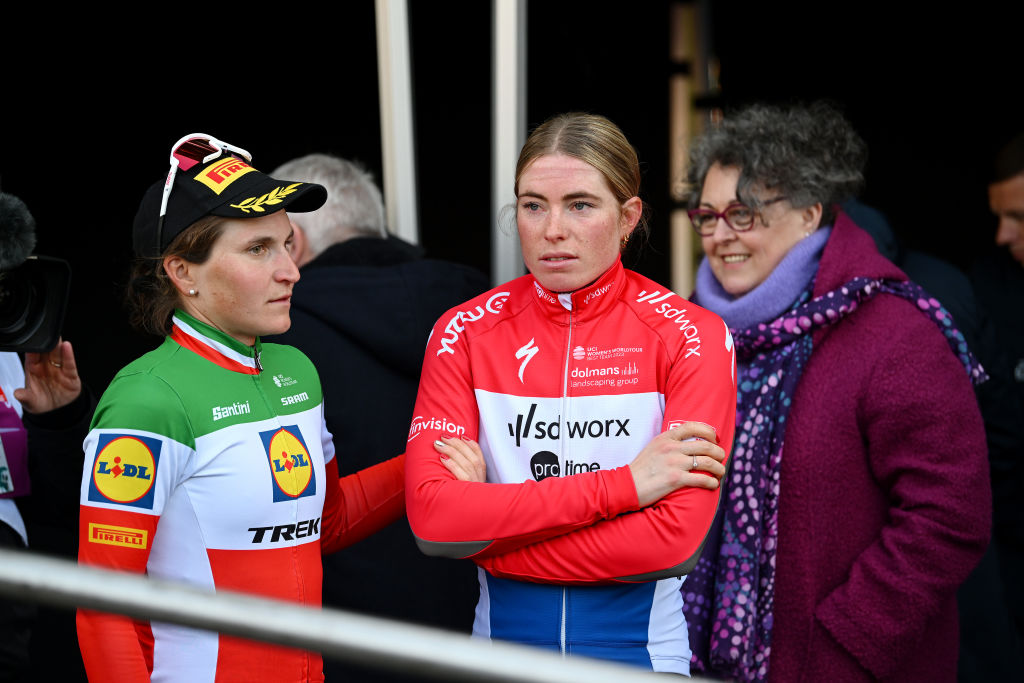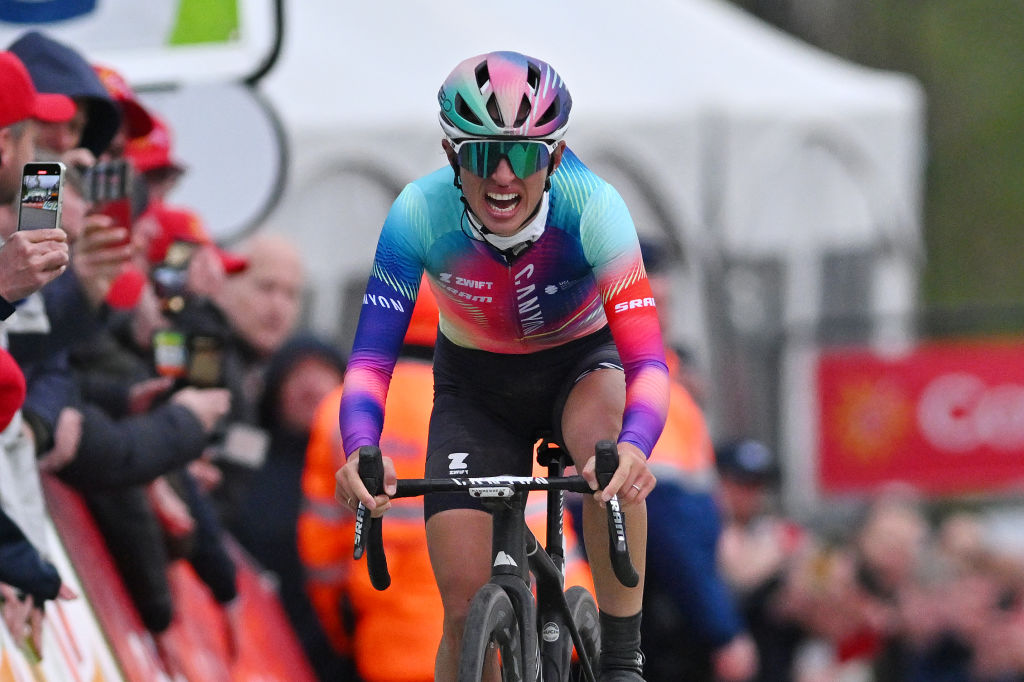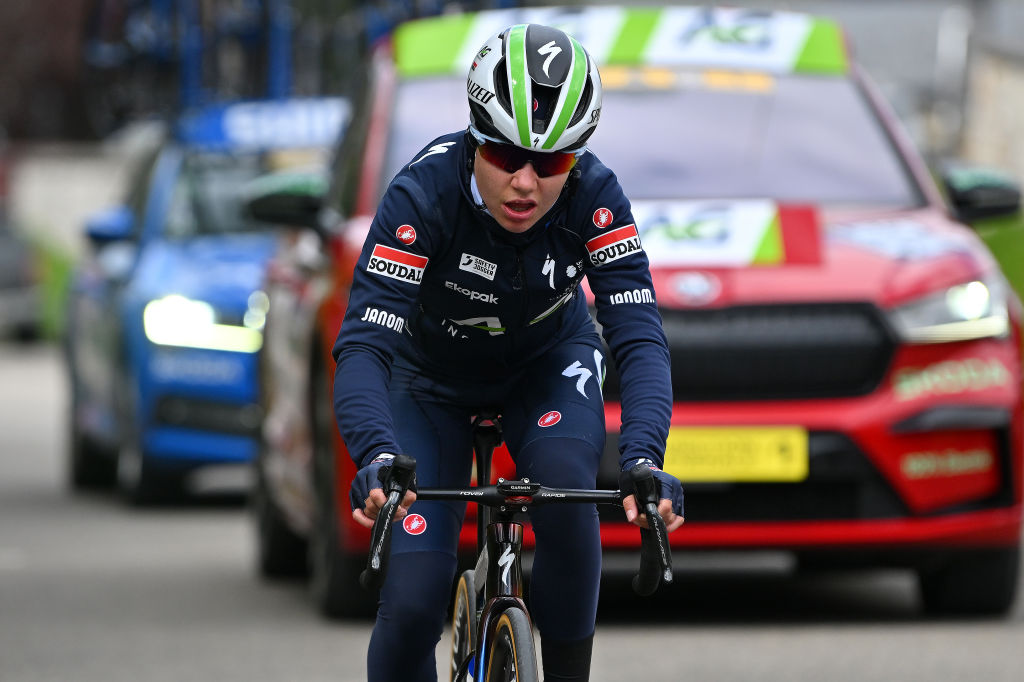
The Spring Classics came to an end on Sunday with Liège-Bastogne-Liège, where Grace Brown emerged victorious ahead of Elisa Longo Borghini and Demi Vollering. The race and result were in keeping with the tone of a Classics campaign that always entertained and often surprised.
Attention switches to stage racing next week with the Vuelta Femenina, but before that, we look back over the three Ardennes Classics and examine some of the conclusions to be drawn from Amstel Gold Race, Flèche Wallonne and Liège-Bastogne-Liège.
Vollering & SD Worx-Protime “back to normal” after dominant 2023
It is perhaps not all that surprising after an out-of-this-world 2023 season, but SD Worx-Protime in general and Demi Vollering in particular are “back to normal.” The Ardennes Classics confirmed that Vollering and her team are no longer the dominant, quasi-unbeatable force they were in the past, with the Dutch champion often huffing and puffing after following attacks by Elisa Longo Borghini (Lidl-Trek) or Kasia Niewiadoma (Canyon-SRAM).
Last season, Vollering won Strade Bianche and Dwars door Vlaanderen and finished second in the Tour of Flanders and Brabantse Pijl before sweeping the Ardennes Classics. This year, Vollering finishes her Classics campaign without any victories at all.
Amstel Gold Race wasn’t a big disappointment for Vollering, who worked for Lorena Wiebes in a shortened race that ended in a sprint. At Flèche Wallonne, Vollering led from the bottom of the Mur de Huy like she did in 2023, but this time she was easily matched by Longo Borghini and Niewiadoma, with the latter sprinting away to win.
At Liège-Bastogne-Liège, Vollering could respond to Longo Borghini’s move on the Côte de la Roche-aux-Faucons but seemed to expect Niewiadoma to close a gap to her teammate Élise Chabbey in the final and was at the very back of the group going into the sprint, admitting after the race that this had been a mistake.
It’s not unlikely that ongoing contract talks with prospective new teams are weighing on Vollering – and that her upcoming departure from the team may make her current teammates that little bit less inclined to bury themselves for her.

Strong and smart Niewiadoma and Canyon-SRAM get results
By comparison, Canyon-SRAM have stepped up their game this spring season, culminating in an emotional Flèche Wallonne victory that ended Niewiadoma’s dry spell of almost five years. The influence of sport director Magnus Bäckstedt played no small part in the team’s good performance across the board.
Ricarda Bauernfeind’s breakaway gave her teammates a free ride in a shortened Amstel Gold Race, and in the final, Niewiadoma launched her trademark Cauberg attack before the team rallied around Soraya Paladin who sprinted to tenth.
At Flèche Wallonne, Chabbey responded to attacks on the Côte d’Ereffe before Niewiadoma followed Vollering on the Mur de Huy. In the past, Niewiadoma was often too eager to attack and paid the price for that – last Wednesday, she kept her powder dry until the last 200 metres. She only made her move when Longo Borghini blinked first, but then she went all-in and opened up a race-winning gap before collapsing into tears of joy after the line.
It was Liège-Bastogne-Liège that arguably saw the team’s strongest showing, though. In a strong breakaway, Chabbey was the strongest rider on the climbs, and Niewiadoma had no trouble in following Longo Borghini and Vollering but had the perfect reason to sit on their wheels. What’s more, Bauernfeind and Neve Bradbury were represented in the group behind.
In the final, Niewiadoma called Vollering’s bluff before she and Chabbey took turns attacking in a textbook case of using their strength in numbers in the front group. Niewiadoma was first onto the finishing straight and might have held on to win if Longo Borghini hadn’t closed the gap like she already had done three times earlier.
New riders breaking through in the Ardennes Classics
Every year, it is exciting to see new talents make a name for themselves in the hilly classics or confirm their previous performances and underline that they will be riders to watch in the future.
Ingvild Gåskjenn (Liv-AlUla-Jayco) broke through with a third place in the Amstel Gold Race that left her speechless after the finish. The 25-year-old Norwegian followed this up with 13th in the Flèche Wallonne and 21st in Liège-Bastogne-Liège.
The eighth place for cyclo-cross world champion Fem van Empel (Team Visma-Lease a Bike) was less of a surprise and more of a confirmation that the 21-year-old will be a force to be reckoned with on the road, too.
22-year-old Kim Cadzow (EF Education-Cannondale) was on the attack twice in Liège-Bastogne-Liège and one of the strongest riders in the breakaway together with Chabbey and eventual winner Grace Brown (FDJ-SUEZ). She played her cards well in her first final of a big Classic and finished sixth.
Tour Down Under winner Sarah Gigante (AG Insurance-Soudal) has had a hard time in Europe, often due to injuries. But the 23-year-old made her mark in Liège-Bastogne-Liège with a solo breakaway before staying with the larger break well into the final. The cherry on top came when she and 20-year-old Flora Perkins (Fenix-Deceuninck) – already a dependable domestique throughout the spring – simply rode away from the chase group in a courageous fight for a top-five result, although they were caught and finished way down the results sheet in the end.

No more early morning starts as women’s races rescheduled to follow the men
For years, nay, decades, a women’s edition of a men’s race being held on the same day meant that riders and team staff had to set their alarm clocks for a wickedly early time. Up to and including 2023, Flèche Wallonne and Liège-Bastogne-Liège started at 8.30am, with the sign-in beginning an hour before that, meaning that riders would have to have breakfast before 6am.
The Flanders Classics race organisation became trendsetters when they decided to put the women’s race after the men’s race instead of before it. One reason was the hope of increasing broadcast viewership for the women’s race as viewers would stay tuned once the men’s race was over. Although roadside crowds still dwindle after the men’s race has passed, the move is a success with increasing viewer numbers for the women’s races.
The rider’s union CPA Women took the initiative after last year’s Ardennes Classics and lobbied the ASO to change its schedule for the Flèche Wallonne and Liège-Bastogne-Liège races. As a result, the races changed to an early-afternoon start, finishing after the men’s events. The Amstel Gold Race kept the women’s race first, though with a more reasonable 9:55 am start – and since the Dutch classic will be organised by Flanders Classics from 2025 onwards, it can be expected to follow the other races’ example next year.







